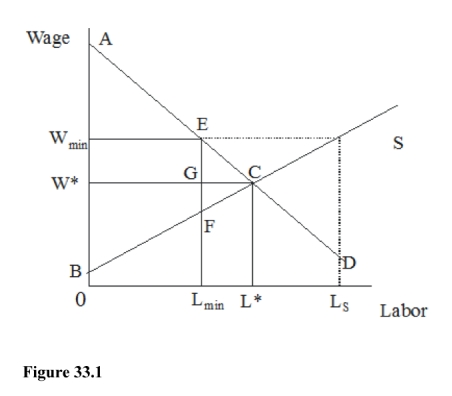Exam 33: Minimum Wage
Exam 1: Economics: the Study of Opportunity Cost124 Questions
Exam 2: Supply and Demand204 Questions
Exam 3: The Concept of Elasticity and Consumer and Producer Surplus173 Questions
Exam 4: Firm Production, Cost, and Revenue158 Questions
Exam 5: Perfect Competition, Monopoly, and Economic Versus Normal Profit119 Questions
Exam 6: Every Macroeconomic Word You Ever Heard: Gross Domestic Product, Inflation, Unemployment, Recession, Depression201 Questions
Exam 7: Interest Rates and Present Value118 Questions
Exam 8: Aggregate Demand and Aggregate Supply110 Questions
Exam 9: Fiscal Policy66 Questions
Exam 10: Monetary Policy104 Questions
Exam 11: Federal Spending76 Questions
Exam 12: Federal Deficits, Surpluses, and the National Debt76 Questions
Exam 13: The Housing Bubble71 Questions
Exam 14: The Recession of 2007-2009: Causes and Policy Responses57 Questions
Exam 15: Is Economic Stagnation the New Normal42 Questions
Exam 16: Is the Fiscalsky Falling: An Examination of Unfunded Social Security, Medicare, and State and Local Pension Liabilities51 Questions
Exam 17: International Trade: Does It Jeopardize American Jobs86 Questions
Exam 18: International Finance and Exchange Rates77 Questions
Exam 19: The European Debt Crisis60 Questions
Exam 20: Economic Growth and Development60 Questions
Exam 21: Nafta, Gatt, Wto: Are Trade Agreements Good for Us42 Questions
Exam 22: The Line Between Legal and Illegal Goods71 Questions
Exam 23: Natural Resources, the Environment, and Climate Change73 Questions
Exam 24: Health Care87 Questions
Exam 25: Government-Provided Health Insurance: Medicaid, Medicare, and the Child Health Insurance Program79 Questions
Exam 26: The Economics of Prescription Drugs62 Questions
Exam 27: So You Want to Be a Lawyer: Economics and the Law62 Questions
Exam 28: The Economics of Crime62 Questions
Exam 29: Antitrust39 Questions
Exam 30: The Economics of Race and Discrimination60 Questions
Exam 31: Income and Wealth Inequality70 Questions
Exam 32: Farm Policy63 Questions
Exam 33: Minimum Wage60 Questions
Exam 34: Ticket Brokers and Ticket Scalping60 Questions
Exam 35: Rent Control31 Questions
Exam 36: Economics of K-12 Education55 Questions
Exam 37: Economics of College and University Education82 Questions
Exam 38: Poverty and Welfare69 Questions
Exam 39: Head Start44 Questions
Exam 40: Social Security60 Questions
Exam 41: Personal Income Taxes55 Questions
Exam 42: Energy Prices67 Questions
Exam 43: If We Build It, Will They Come and Other Sports Questions61 Questions
Exam 44: The Stock Market Crashes57 Questions
Exam 45: Unions66 Questions
Exam 46: Walmart: Always Low Prices and Low Wages- Always41 Questions
Exam 47: The Economic Impact of Casino Gambling39 Questions
Exam 48: The Economics of Terrorism43 Questions
Select questions type
After increasing from $5.15 in 2007 to $7.25 in 2009, the inflation-adjusted minimum wage
(Multiple Choice)
4.8/5  (36)
(36)
Suppose you were to hear a politician defend the minimum wage on the grounds that it would not cause that much unemployment because firms have to hire a certain number of workers, you would know this person to be relying on the ____ argument.
(Multiple Choice)
5.0/5  (24)
(24)
Economists generally believe that increases in the minimum wage will
(Multiple Choice)
4.9/5  (37)
(37)
Suppose you were to hear a politician defend the minimum wage on the grounds that the low-wage workers would spend more of their extra income that wealthier employers would and therefore the effect would be positive, you would know this person to be relying on the ____ argument.
(Multiple Choice)
4.8/5  (37)
(37)
 -In Figure 33.1, how many people would be unemployed at the minimum wage?
-In Figure 33.1, how many people would be unemployed at the minimum wage?
(Multiple Choice)
4.8/5  (34)
(34)
The "macroeconomics" rebuttal to the traditional analysis of the minimum wage argues that
(Multiple Choice)
4.7/5  (40)
(40)
To achieve its goal of keeping a family of four with one wage earner out of poverty, the minimum wage would have to be
(Multiple Choice)
4.8/5  (36)
(36)
The largest family size for which the earnings of a single minimum wage job holder has been above the poverty line is
(Multiple Choice)
4.8/5  (37)
(37)
To get to its inflation adjusted all-time high, the minimum wage in 2016 would have to be at least
(Multiple Choice)
4.8/5  (39)
(39)
The "elasticity" rebuttal to the traditional analysis of the minimum wage, stating that employers' demand for workers is unresponsive to wage changes, centers on the idea that
(Multiple Choice)
4.8/5  (38)
(38)
At $5.15 per hour the 2007 inflation adjusted minimum wage was
(Multiple Choice)
4.8/5  (39)
(39)
If the demand for labor is inelastic then the unemployment caused by raising the minimum wage is
(Multiple Choice)
4.8/5  (36)
(36)
Suppose you were to hear an economist defend the minimum wage on the grounds that she estimated that the demand for labor is nearly vertical, you would know her to be relying on the ____ argument.
(Multiple Choice)
4.8/5  (45)
(45)
Suppose you were to hear an economist oppose the minimum wage on the grounds that she estimated the loss to small businesses and to the unemployed and found that it exceeded the gain to workers getting a higher wage. You would know her to be relying on the ____ argument.
(Multiple Choice)
4.7/5  (42)
(42)
The heart of the argument against an increase in the minimum wage is one based on
(Multiple Choice)
4.9/5  (42)
(42)
Of the people working for the minimum wage ___ live in households with incomes below the poverty line.
(Multiple Choice)
4.8/5  (43)
(43)
It is impossible to raise the minimum wage so high to hurt workers generally.
(True/False)
4.9/5  (27)
(27)
The longest period of time where the minimum wage remained constant in nominal terms was during
(Multiple Choice)
4.9/5  (27)
(27)
It is always in the interests of workers for the minimum wage to be as high as possible.
(True/False)
4.9/5  (39)
(39)
Showing 21 - 40 of 60
Filters
- Essay(0)
- Multiple Choice(0)
- Short Answer(0)
- True False(0)
- Matching(0)